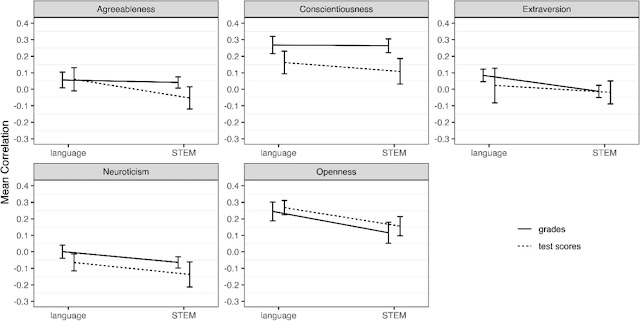De ijverige, nauwkeurig werkende leerling haalt goede cijfers; de drukke, gezellige leerling haalt minder goede cijfers. Dit soort ideeën lijken vooroordelen, maar onderzoek naar de relatie tussen persoonskenmerken en leerprestaties is voor een deel in lijn met deze ideeën. Een nieuwe meta-analyse in Educational Psychology Review onderzocht de relatie tussen persoonskenmerken (volgens de bekende Big Five) en leerprestaties en keek daarbij onder andere ook naar verschillen tussen domeinen (taal vs. STEM). Deze overzichtsstudie laat zien dat persoonlijkheidskenmerken inderdaad samenhangen met leerprestaties, maar dat de mate waarin en de richting van de samenhang per domein kan verschillen. Het kenmerk openheid blijkt bijvoorbeeld een sterkere voorspeller voor leerprestaties in het taal- dan in het STEM-domein. Hetzelfde geldt voor extraversie en vriendelijkheid. Neuroticisms blijkt dan weer een sterkere negatieve samenhang met leerprestaties in het STEM-domein dan in het taaldomein te hebben. Consciëntieusheid blijkt zowel voor het taal- en het STEM-domein leerprestaties te voorspellen.
Het abstract
Students’ academic achievement is a central predictor of a long list of important educational outcomes, such as access to higher education and socioeconomic success. Prior studies have extensively focused on identifying variables that are related to academic achievement and an important variable in this context appears to be students’ personality. Notably, although findings from more recent studies suggested that the association between student achievement and personality varies by the subject domain (language vs. STEM) and the type of achievement measure (grades vs. test scores), systematic meta-analytical evidence is still lacking. To address this gap in the educational research literature, we conducted a meta-analysis based on 78 studies, with 1491 effect sizes representing data from 500,218 students and 110 samples from elementary to high school. We used a random-effects model with robust variance estimation to calculate mean effect sizes and standard deviations. We found moderating effects of measure or domain for all five personality traits, with differences in the direction of the effects. Our results highlight the importance of the domain and measure when examining how personality traits relate to academic achievement in school. The combination of subject domain and achievement was also found to be relevant for some of the traits. These findings emphasize that subject domains and types of achievement measures should be explicitly considered when investigating the personality saturation of student achievement. We discuss implications for future research, highlighting that there is no “best” or “more objective” achievement measure but, instead, that achievement measures should be chosen based on the research question of interest.

Consciëntieusheid is denkelijk een anglicisme, nauwgezetheid lijkt me het NL woord. idem Neuroticisms: neuroticisme of gewoon neurotisch gedrag
BeantwoordenVerwijderen